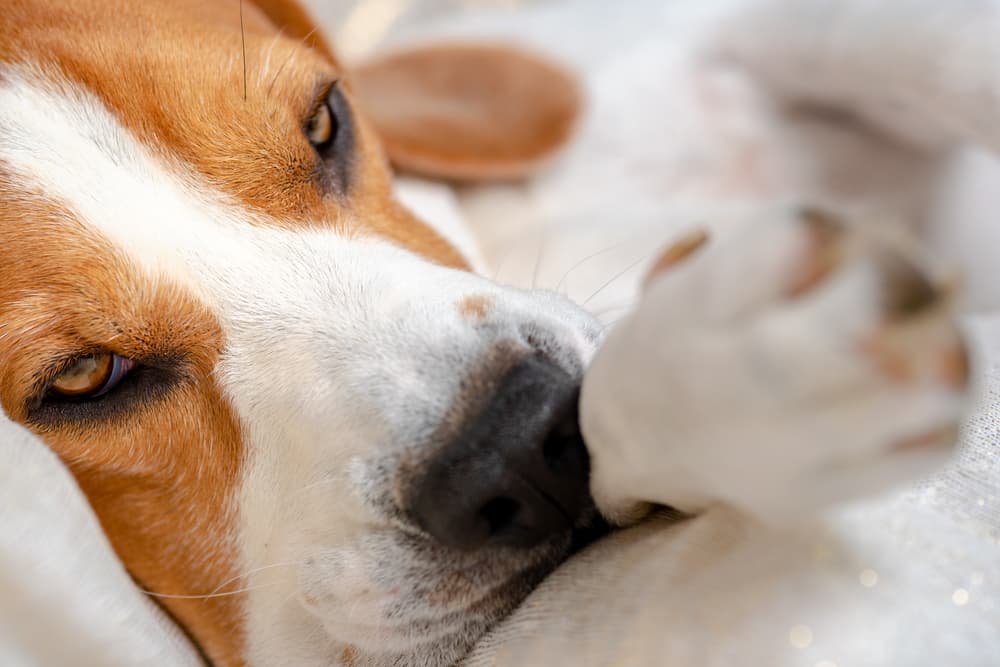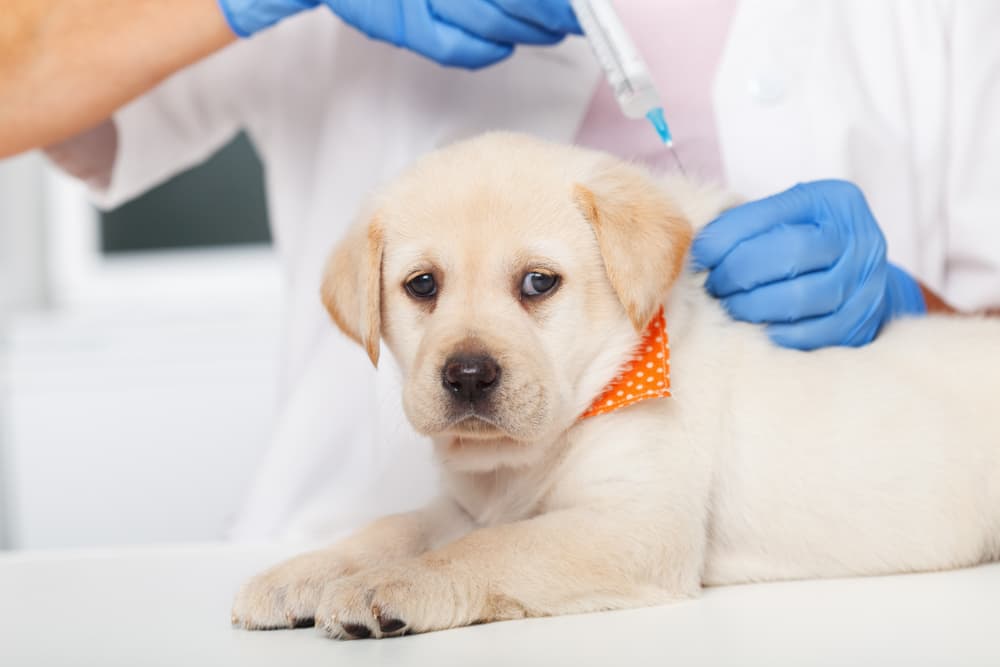Parvovirus in Dogs

Overview
- Canine parvovirus is a contagious virus that spreads by dogs coming into contact with infected feces.
- Parvovirus (parvo) is very stable and difficult to kill as the virus can live for years on many surfaces.
- Until puppies complete the full vaccine series at 4 months, they are at highest risk for contracting parvo.
- There is no cure for parvo and it is recommended that dogs be hospitalized for treatement.
- Prevention for parovirus is by following your veterinarian’s vaccine recommendations.
Sponsored by CareCredit
Parvovirus in dogs, commonly referred to as parvo, is a severe, highly contagious, and life-threatening viral condition that causes bloody diarrhea, vomiting, dehydration, and immune system dysfunction.
Fortunately, with proper treatment, nearly 90 percent of dogs diagnosed with parvovirus survive. Veterinarians can ease symptoms with supportive care (e.g., anti-nausea drugs like Cerenia to treat vomiting). And, best of all, parvo is easy to prevent with proper vaccination.
What Is Parvovirus?

Canine parvovirus, also known as CPV-2, is a highly contagious virus. It is spread from dog to dog and by coming into contact with infected feces. The virus attacks a dog’s gastrointestinal system and immune system.
It is seen worldwide, all year round, but it tends to spike in spring and summer.
While all dogs are susceptible to parvovirus, a few breeds seem to suffer the effects of it more than others. These breeds include:
- Rottweilers
- Doberman Pinschers
- English Springer Spaniels
Can Humans Get Parvo?
Parvovirus in dogs cannot be transmitted to humans. Humans have their own strain of parvovirus called parvovirus B19, which causes Fifth’s disease, a condition that causes mild rash-like symptoms. Humans cannot transmit Fifth’s disease to dogs, and humans cannot catch parvo from dogs.
Can Dogs Get Parvo from Cats?
While canine parvovirus is closely related to a virus that affects cats called feline panleukopenia virus (FPV), dogs cannot contract parvo from cats, and vice versa. The viruses are species specific, which means they only infect one specific species of mammal. Canine parvovirus only affects dogs, feline panleukopenia only affects cats.
How Do Dogs Get Parvo?

Parvovirus infects the cells of a dog’s intestinal tract, and is shed in the feces of infected animals. Other dogs become infected when they come into contact with the virus, such as sniffing poop or the anus of a dog that is infected with parvovirus.
Parvovirus is very stable and difficult to kill. The virus can live for years in the environment on many types of surfaces, infecting dogs that come into contact with it.
How Do Puppies Get Parvo?
Parvovirus is much more common in puppies and causes more severe symptoms in puppies, especially those between the ages of 6 weeks to 16 weeks. If your puppy needs to be hospitalized for parvo treatment, your primary focus will be on helping your pet get better. Having a health and pet care credit card, such as CareCredit, can give you the peace of mind needed to care for your puppy.*
Puppies do not receive the full protective benefit of the parvovirus vaccine until they have completed the full vaccine series, which doesn’t finish until a puppy is 4 months old. Because they are not considered protected until they finish the vaccines and they have immature immune systems, puppies in this age group are at highest risk for contracting parvo.
Can Older Dogs Get Parvo?
Any dog of any age can contract parvovirus. Dogs that are housed in crowded environments, such as shelters or kennels, are at greatest risk. Stress from crowding and poor sanitation both tax the immune system and make dogs more susceptible to parvovirus.
Signs of Parvovirus in Dogs

The telltale signs of parvovirus in dogs include:
- Sudden-onset bloody diarrhea
- Loss of appetite
- Repeated vomiting
- Fever
- Loss of energy
Severe cases will cause a dog to go into shock and have pale or white gums. In rare cases, puppies may collapse and die without any signs.
Stages of Parvo

Parvovirus typically behaves the same in most dogs. After a dog contracts parvovirus, it takes 2-4 days for the virus to make its way to the intestinal tract, and most dogs will begin showing signs and shedding the virus in their feces around days 3-4. Most dogs have symptoms associated with parvovirus for 7-10 days. Dogs stop being contagious 2 weeks after they first show signs.
How Long Does Parvo Last?
Since there is no cure for parvovirus in dogs, it has to run it course. The length a dog is affected by parvovirus can be anywhere from 3-5 days in mild cases or up to 10 to 12 days in severe cases. Parvo in dogs typically lasts a week.
Can a Dog Get Parvo Twice?
Once a dog contracts parvovirus it is highly unlikely that the dog will get infected again. Once the immune system has eliminated the virus, a dog is immune to the virus for several years. There is no guarantee that a dog won’t become infected a second time, which is why getting regular vaccinations is important to prevent parvovirus.
Diagnosing Parvo in Dogs

Parvovirus is diagnosed by a veterinarian using a combination of a physical exam and laboratory testing. Most veterinarians have a fecal test they can run right at the veterinary hospital to determine whether a dog is positive for parvovirus.
In some cases, a veterinarian will also run bloodwork to check blood cell counts and organ function and/or a fecal test to check for intestinal parasites.
Parvo Treatment for Dogs

Until relatively recently, there was no available treatment for canine parvovirus. Veterinarians provided supportive care, but the virus simply had to run its course. In 2023, however, a new treatment was approved for use in canine parvovirus. Canine Parvovirus Monoclonal Antibody (CPMA) is an antibody treatment that targets canine parvovirus, improving patient outcomes and shortening the course of infection.
Because dogs infected with parvovirus are infectious, difficult to care for, and the cause of death in parvo is usually dehydration and secondary bacterial infections, it is recommended that dogs be hospitalized for treatment. Hospitalized dogs are kept in isolation so they do not infect other dogs. The dogs are given intravenous fluid and electrolyte therapy, anti-nausea medications like Cerenia, and antibiotics.

Parvovirus also attacks the immune system. Because of this, some dogs may require a blood or plasma transfusion to replace blood cells that the virus destroyed and provide additional antibodies to fight the virus.
Dogs are not fed any food or water until they stop vomiting. 90 percent of dogs hospitalized and treated for parvovirus survive to live long and healthy lives.
Medications Used to Treat Canine Parvovirus
Dogs undergoing parvovirus treatment are given a combination of medications and therapies to help manage symptoms. These include:
- Canine Parvovirus Monoclonal Antibody (CPMA)
- Maripotant, to reduce nausea and vomiting
- Antibiotics, such as amoxicillin and clavulanic acid, for secondary bacterial infections
- Fluids (lactated ringers solution or saline solution) for dehydration
- Electrolytes
- Therapeutic bland, low fat dog food
Cost to Treat Parvovirus in Dogs
Dogs infected with parvovirus are usually hospitalized for 3-5 days. Cost of treatment can range from $1,000-$4,000, depending on the length of treatment and whether plasma transfusions are required. It’s natural to feel stressed about paying for an unexpected illness like parvo. With a CareCredit credit card, you can feel financially prepared from the start. It allows you to pay over time with flexible financing options.*
How to Prevent Dogs From Contracting Parvovirus

You can prevent parvovirus in your dog or puppy by following your veterinarian’s vaccine recommendations. Until your puppy has received all puppy vaccines, he or she is not considered protected, however. Do not take your puppy to dog parks or other places that dogs frequent until all vaccines are given and your veterinarian gives you the go ahead. Don’t let your puppy socialize with dogs that have an unknown vaccine status.
If you have had a dog with parvovirus, then disinfection of your entire environment is key to prevent other dogs from getting sick. Parvovirus is very hardy, but it can be killed by a 1:30 dilution of bleach. You can spray this on all surfaces and wash all bedding or towels with bleach solution. Do not throw any bedding or towels away without disinfecting first, as they can be contagious. Ask your veterinarians about the best methods for disinfecting your home.
Parvo Vaccine for Dogs
Fortunately, a safe and effective vaccine is available to prevent parvovirus in dogs. The parvovirus vaccine is considered a core vaccine, which means all dogs should receive it. The standard vaccine protocol in puppies is starting boosters at 6-8 weeks of age, and then having the vaccine repeated every 3 weeks until the puppy reaches 16 weeks of age. An additional booster is given at 1 year of age, and then every 3 years after that.
*Subject to credit approval. See carecredit.com for details.
This information is shared solely for your convenience. Neither Synchrony nor any of its affiliates, including CareCredit, make any representations or warranties regarding the products described, and no endorsement is implied. You are urged to consult with your individual veterinarian with respect to any professional advice presented.









